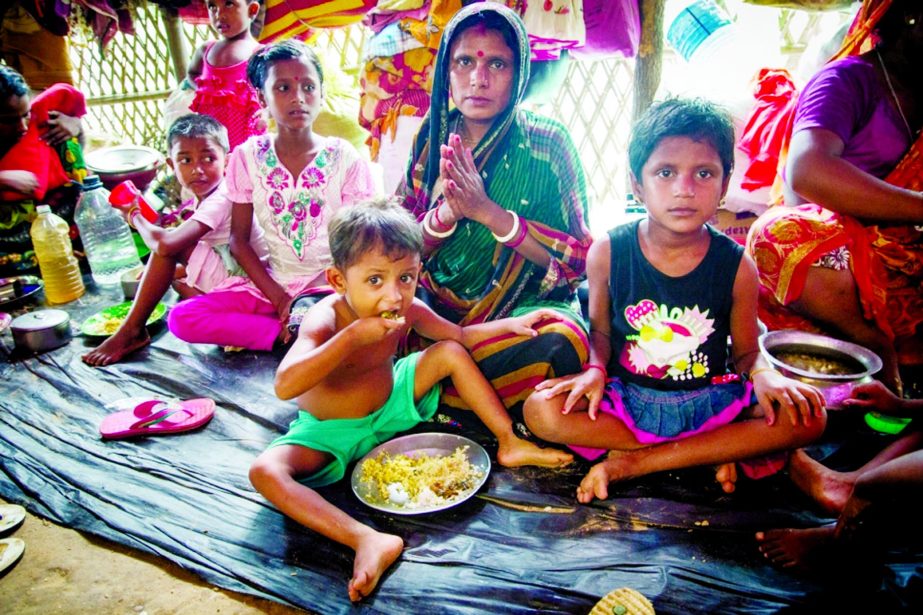
Desk Report :
Two neighbouring villages were already in flames when the figures dressed in black, their faces covered, reached Onu Bala’s home in northern Rakhine state of Myanmar.
As they tossed incendiaries into the houses, she ran with her three daughters, aged three to eight, into the forest, where they spent two nights in the open, thirsty and hungry.
She is now safe in this small village in southeast Bangladesh, where she is living in an old chicken
farm repurposed as a community shelter, as she puzzles over what happened.
“I don’t know who they were, the only thing I could see were their eyes … It didn’t matter if we were Hindu or Muslim … they were burning down everything,” she says.
While the vast majority of refugees fleeing to Bangladesh are Muslim, a smaller number, like Onu, are Hindu. They speak the same dialect and self-identify as Rohingya, and have been swept up in the purge that has driven half-a-million women, children and men to flee across the border.
In total, 101 Hindu families comprising 523 individuals are currently living in Hindu Para, a farming community fringed by forest that was settled by a previous influx of Hindu refugees in the 1990s, according to UNHCR.
Also in the community shelter is 50-year-old barber Nironjon Rudro, a father of four. He remembers his home village as a hardworking community of Muslim farmers and Hindu laborers and small business owners, who lived side by side “in harmony, for years.” That peace shattered on August 26 as his uncle came running from the next village with a tale of murder.
A masked mob had entered that community, butchered another relative, and had started burning houses. The warning came too late as by then they had Nironjon’s village surrounded. “They were armed with guns, knives and petrol bombs,” he recalls.
Their captors spoke both Burmese and Rohingya, so it was not clear to him who they were. They kept villagers hostage for five days, but when news of violence at another village distracted them, Nironjon and his family seized their chance: “We escaped with just the clothes we were wearing and ran for the hills.”
Two neighbouring villages were already in flames when the figures dressed in black, their faces covered, reached Onu Bala’s home in northern Rakhine state of Myanmar.
As they tossed incendiaries into the houses, she ran with her three daughters, aged three to eight, into the forest, where they spent two nights in the open, thirsty and hungry.
She is now safe in this small village in southeast Bangladesh, where she is living in an old chicken
farm repurposed as a community shelter, as she puzzles over what happened.
“I don’t know who they were, the only thing I could see were their eyes … It didn’t matter if we were Hindu or Muslim … they were burning down everything,” she says.
While the vast majority of refugees fleeing to Bangladesh are Muslim, a smaller number, like Onu, are Hindu. They speak the same dialect and self-identify as Rohingya, and have been swept up in the purge that has driven half-a-million women, children and men to flee across the border.
In total, 101 Hindu families comprising 523 individuals are currently living in Hindu Para, a farming community fringed by forest that was settled by a previous influx of Hindu refugees in the 1990s, according to UNHCR.
Also in the community shelter is 50-year-old barber Nironjon Rudro, a father of four. He remembers his home village as a hardworking community of Muslim farmers and Hindu laborers and small business owners, who lived side by side “in harmony, for years.” That peace shattered on August 26 as his uncle came running from the next village with a tale of murder.
A masked mob had entered that community, butchered another relative, and had started burning houses. The warning came too late as by then they had Nironjon’s village surrounded. “They were armed with guns, knives and petrol bombs,” he recalls.
Their captors spoke both Burmese and Rohingya, so it was not clear to him who they were. They kept villagers hostage for five days, but when news of violence at another village distracted them, Nironjon and his family seized their chance: “We escaped with just the clothes we were wearing and ran for the hills.”

